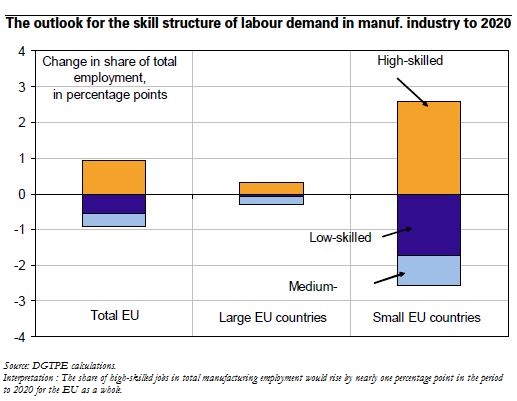Trésor-Economics No. 11 - How the new features of globalisation are affecting markets in Europe
Until the end of the 1990’s, the rapid growth of trade has had only a limited impact on Europe’s labour markets and inequalities, insofar as it mainly affected countries with comparable levels of development. The growing share of the major emerging countries in world trade could change this pattern, notably by pushing the European countries to specialise more: that is what the growth in the share of inter-industry trade in world trade since the end of the 1990s suggests, coming after twenty years of decline.
This new phase in the process of globalisation could entail higher adjustment costs than in the past. In the developed countries, jobs are expected to shift towards less low-skilled labour intensive industries, which implies a likely decline in total demand for low-skilled labour in Europe.
Assuming the share of inter-industry trade continues to grow at its present pace until 2020, a forward-looking exercise suggests that the small European countries are likely to come under greater pressure to specialise than the large countries as far as manufacturing industry is concerned.
On this view, the observed deterioration in the relative position of the medium-skilled over the past 10 years would be amplified by greater specialisation in Europe, against a background of significantly increased jobs supply at this skill level. Depending on how the labour market operates, these pressures on the medium-skilled could have repercussions on the situation of the least-skilled: by taking jobs for which they are overqualified, the medium-skilled could take lower-skilled jobs and thus displace the problem.
Technological progress biased in favour of skilled labour and the trend to overqualification at all skill levels could, in addition to all of the shocks not modelled here, modify developments attributable to globalisation.
